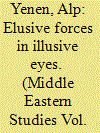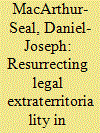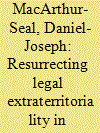|
|
|
Sort Order |
|
|
|
Items / Page
|
|
|
|
|
|
|
| Srl | Item |
| 1 |
ID:
161190


|
|
|
|
|
| Summary/Abstract |
This article examines two sites of British investment in nineteenth-century Iraq, exploring the different interests and ideologies – both British and Ottoman – underlying each one, and using the funding controversies which plagued both projects as windows on the political and economic relationships which crystallized through these ventures and informed post-war governance. Ottoman Iraq provides an important perspective on global British economic interests: although it encompassed zones of Britain's informal empire, the Ottoman state intensified its own imperial ambitions towards the end of the nineteenth century. This created tensions within Ottoman policies towards the British, which were complicated by the friction between British state and commercial interests. By 1914, the controversies which plagued both projects seemed close to a breaking point. The outbreak of the First World War, however, entrenched existing patterns of financial and infrastructural involvement as part of the occupation, and encouraged the creation of a development paradigm in the Mandate.
|
|
|
|
|
|
|
|
|
|
|
|
|
|
|
|
| 2 |
ID:
161193


|
|
|
|
|
| Summary/Abstract |
In the aftermath of the First World War, British officials had difficulty understanding the elusive forces behind the Anatolian resistance movement. They anxiously assumed that Kemalists were being controlled by the Unionist leaders in exile and that they were part of an international conspiracy. In this confusion, the fugitive Unionist leaders received disproportionate attention and credit in British intelligence reports, with critical consequences for their political sense-making and decision-making. I argue that the preconception of ‘Young Turks’ in general as well as assumptions about Unionist leaders’ alleged and actual activities after 1918 were crucial for British officialdom's policies towards the Anatolian resistance movement.
|
|
|
|
|
|
|
|
|
|
|
|
|
|
|
|
| 3 |
ID:
161194


|
|
|
|
|
| Summary/Abstract |
This article proposes to re-examine the Turkish–Iraqi Frontier dispute by observing the strategies and attitudes of local populations, in particular in the border areas, between 1918 and 1925, a time when the region became a battleground of British and Turkish agents seeking to secure the loyalties of the local community leaders. The latter played a relevant role in two fundamental and complementary ways. First, by playing different sides, local leaders helped to inform the discourse that served to justify the opposing claims over Mosul province. Second, borderlanders pushed British and Turkish authorities to come to the conclusion that an international agreement was the best solution for both countries. I argue the socio-historical process that led Turkey and Great Britain to accept the Brussels line cannot be fully apprehended without taking into account local players and their interactions with a variety of both state and non-state actors.
|
|
|
|
|
|
|
|
|
|
|
|
|
|
|
|
| 4 |
ID:
161191


|
|
|
|
|
| Summary/Abstract |
The short-lived Allied occupation of Istanbul produced a distinctive blend of legal innovation and revival, creating new mixed courts, reanimating the contested capitulations, and pressuring the Ottoman government to abandon wartime legislation in favour of new laws conducive to European interests. Such measures were intended to serve a military regime notable as much for its disregard for legal procedure when it suited the interests of the occupying Allies as its insistence on protecting the legal privileges of its own subjects. The article shows how the resulting tensions between Britain and the Istanbul and Ankara governments over law and its enforcement furthered the rift between Britain and Turkey until the eventual abandonment of extraterritoriality during the Lausanne conference in 1923.
|
|
|
|
|
|
|
|
|
|
|
|
|
|
|
|
| 5 |
ID:
161192


|
|
|
|
|
| Summary/Abstract |
The short-lived Allied occupation of Istanbul produced a distinctive blend of legal innovation and revival, creating new mixed courts, reanimating the contested capitulations, and pressuring the Ottoman government to abandon wartime legislation in favour of new laws conducive to European interests. Such measures were intended to serve a military regime notable as much for its disregard for legal procedure when it suited the interests of the occupying Allies as its insistence on protecting the legal privileges of its own subjects. The article shows how the resulting tensions between Britain and the Istanbul and Ankara governments over law and its enforcement furthered the rift between Britain and Turkey until the eventual abandonment of extraterritoriality during the Lausanne conference in 1923.
|
|
|
|
|
|
|
|
|
|
|
|
|
|
|
|
| 6 |
ID:
161189


|
|
|
|
|
| Summary/Abstract |
The relationship between Turkey and Britain shifted dramatically in the first three decades of the twentieth century, with the one-time diplomatic defender of Ottoman integrity emerging as its most formidable foe during the First World War and War of Independence. Despite this history of enmity, Turco–British relations entered a period of remarkable recovery in the years after 1923 as potential areas of conflict, such as the status of Mosul province and militarisation and access to the Dardanelles and Bosphorus, were resolved. Nevertheless, recriminations with their origins in this crucial period of the collapse of the Ottoman Empire and foundation of the Turkish Republic lingered, sustaining suspicions over British intentions towards Turkey and its neighbours up until the present. Perhaps surprisingly, the UK–Turkey relationship has remained notably cordial in the midst of growing diplomatic hostility between Turkey and its Nato partners over the past two years. In a special issue of Middle Eastern Studies, historians re-examine diplomatic, economic, cultural, and intellectual connections between the two countries during the period 1914–1939, advancing historical scholarship on this crucial relationship through the use of sources from Turkey, Britain, and further afield.
|
|
|
|
|
|
|
|
|
|
|
|
|
|
|
|
| 7 |
ID:
161195


|
|
|
|
|
| Summary/Abstract |
This article seeks to explain how Britain and Turkey established a partnership in the second half of the 1930s despite the fact that they failed to agree upon a common rival to stand against. The prevailing International Relations literature highlights the existence of a common enemy as an essential component of alliance formation in world politics. The paradox underlying the British–Turkish partnership was the absence of a common enemy, since Britain was mainly disturbed by the revisionist policies of Germany, while Turkey was threatened by Italy's aggressive policy over the Mediterranean. In this respect, the article will first discuss how the academic literature explains the essential components of alliance formation in international relations. The second section will discuss in detail how British and Turkish threat perceptions diverged emphasizing the lack of a common rival. The final section will discuss how a bilateral partnership was successfully forged despite the absence of a common rival. Overall, the article argues that Britain and Turkey formed a partnership without a common enemy, as they shared a common fear of abandonment, i.e. the fear of losing an actual or a potential ally to an enemy.
|
|
|
|
|
|
|
|
|
|
|
|
|
|
|
|
|
|
|
|
|